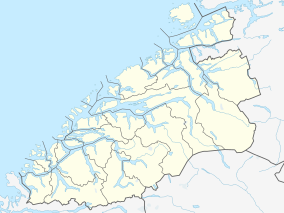Selvikvågen Nature Reserve
| Selvikvågen Nature Reserve | |
|---|---|
| Selvikvågen naturreservat | |
| Nearest city | Steinshamn |
| Coordinates | 62°46′39″N 6°26′26″E / 62.77750°N 6.44056°E |
| Area | 47.1 ha (116 acres) |
| Established | 1988 |
| Designated | 18 March 1996 |
| Part of | Harøya Wetlands System |
| Reference no. | 806[1] |
The Selvikvågen Nature Reserve (Norwegian: Selvikvågen naturreservat) is located on Harøya island in the municipality of Ålesund in Møre og Romsdal county, Norway.[2]
The area received protection in 1988 "to preserve an important wetland area with associated plant communities, bird life and other wildlife,"[3] according to the conservation regulations. Selvikvågen ('Selvik Bay') is a shallow bay with conservation-worthy beach meadows and narrow coves in the inner part, and with mudflats and large tidal areas; it is shielded from the sea by islets. The site is a grazing and nesting area for ducks and waders, and is also botanically rich, with 87 identified plant species, including curved sedge (Carex maritima), yellow flag (Iris pseudacorus), and water ragwort (Jacobaea aquatica).
The reserve is one of six natural areas that were included in the Harøya Wetlands System Ramsar site, which was established in 1996.[4]
References
[edit]- ^ "Harøya Wetlands System". Ramsar Sites Information Service. Retrieved 25 April 2018.
- ^ "Selvikvågen". Mijlø-direktoratet. Retrieved August 8, 2017.
- ^ "Forskrift om vern av Selvikvågen naturreservat, Sandøy kommune, Møre og Romsdal". May 27, 1988. Retrieved August 8, 2017.
å ta vare på eit viktig våtmarksområde med tilhøyrande plantesamfunn, fugleliv og anna dyreliv
- ^ "Harøya Wetlands System in Norway". Protected Planet. United Nations Environment World Conservation Monitoring Centre. Archived from the original on August 8, 2017. Retrieved August 8, 2017.


